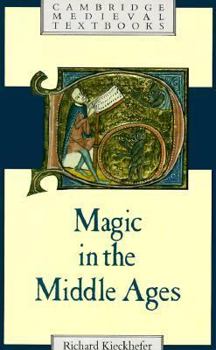Book Overview
How was magic practiced in medieval times? How did it relate to the diverse beliefs and practices that characterized this fascinating period? Richard Kieckhefer surveys the growth and development of... This description may be from another edition of this product.
Format:Paperback
Language:English
ISBN:0521312027
ISBN13:9780521312028
Release Date:January 1990
Publisher:Cambridge University Press
Length:230 Pages
Weight:0.60 lbs.
Dimensions:0.5" x 5.4" x 8.5"
Customer Reviews
5 ratings
You need to read this!
Published by Thriftbooks.com User , 15 years ago
Couldn't ask for a better recopilation of information on witches in the middle ages. Reading it made me want to read more about it. If someday I was to loose my book, I'll buy another copy.
Some magic was condoned
Published by Thriftbooks.com User , 17 years ago
This book looks at the growth and development of magic in medieval times. The author relates magic to to religion, science, philosophy, art, literature and politics. He also examines how some forms of magic were practiced or allowed by the Catholic Church. Why is this important? Because it shows that some forms of magic were allowed before and during the witch hunts, but that magic practiced by women was punishable by death.
Fun History of Magic
Published by Thriftbooks.com User , 18 years ago
At the end of the book, in talking about the witch trials, Kieckhefer tells us, "The prosecutors were zealots, and like most zealots they were inspired by holy enthusiasm mixed with skewed perceptions. How their perceptions got skewed is a long story, and the telling of that story has been the point of the book." The only complaint I have about the book is that, if this was the point of the book, it would have been very nice if he'd mentioned that this was what he was trying to do somewhere a bit earlier and written the book in a way that flowed from the purpose. Instead while I was reading this very amusing book, I kept wondering what the point was and if Kieckhefer'd given any thought to its organization beyond scribbling a few chapter titles. The main concern seems to be what the difference between natural and demonic magic, and while Kieckhefer's completely fair (often you can't even tell if he believes in magic or not), the final answer is pretty close to "not much." It has a nice collection of anecdotes and a good discussion of general trends, but none of it ever seems to lead anywhere until the last chapter. The pointlessness isn't really annoying. Each chapter, from those on Classical and Pagan belief and practice in magic to those concentrating on a single aspect of medieval magical practice is fun. From gossip about the Antipope to the use social insects as oral contraceptives, there's always something interesting around the corner. Even the repitition wasn't particularly glaring. It doesn't hurt that the book starts off well. The first section "Two Case Studies" describes two books, one a book of instructions for running a large household that included spells and crafts alike and the other a "necromancer's manual" from one of many secret clerical sorcerers (one of which was the Antipope, Benedict XIII). The former included marginal comments by later users that I think I'll end with: "This is utterly false, superstitious, and practically heretical." "This would be good --- if it were true!"
Excellent Introductory History of Magic
Published by Thriftbooks.com User , 22 years ago
Richard Kieckhefer's "Magic in the Middle Ages" is a relatively short but comprehensive scholarly summary of the long and fascinating history of magic during Europe's middle ages and its relationship to witchcraft. The author analyzes the many varied influences on magical beliefs from classical literature, folk beliefs, magical texts, biblical sources, and contemporary scholarly and theological treatises. He shows how the beliefs in magic changed over time and how each area influenced the popular and scholarly beliefs in magic and the supernatural. Ultimately, he shows that beliefs in magic, like relgion to which it is closely related, changes over time as people's perceptions change. He also shows the relationship between magic and witchcraft and how they both played roles in the witch craze of the early modern period. This book is required reading in many witchcraft and medieval studies classes and justly so.
Great scholarly review of the subject.
Published by Thriftbooks.com User , 25 years ago
If you need a basic review of the beliefs and practices surrounding magic and its use in late antiquity through the witch hysteria of the 17th century, buy this book. It is well-written, fascinating, covers ground not dug up elsewhere, and will lead you to explore the subject further on your own (a hallmark of a great book, I think).






